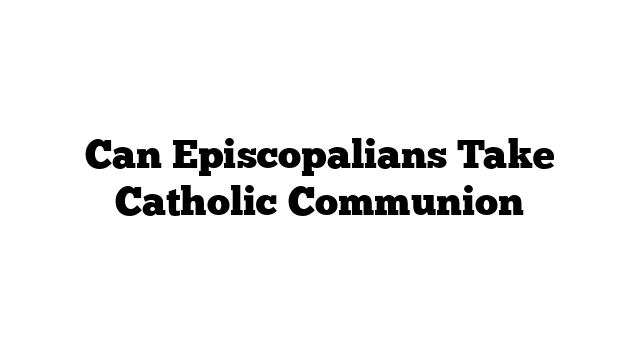Inter-faith & Inter-denomination
Can Episcopalians Take Catholic Communion?
In today’s diverse religious landscape, it is not uncommon for individuals to seek spiritual solace and community in various churches and denominations. However, one question that often arises is whether Episcopalians, who are part of the Anglican tradition, can take Catholic communion.
To understand the answer to this question, it is necessary to delve into the theological beliefs and practices of both the Episcopal Church and the Roman Catholic Church.
The Episcopal Church, as a branch of the Anglican Communion, practices open communion. This means that they welcome all baptized Christians, regardless of their religious affiliation, to partake in the Eucharist. In the eyes of the Episcopal Church, a person’s baptism is the primary requirement for receiving communion.
On the other hand, the Roman Catholic Church holds a different perspective on communion. According to Catholic doctrine, receiving communion is only permissible for baptized Catholics who are in a state of grace and are in full communion with the Church. The Catholic Church believes that the Eucharist is not merely symbolic but rather the actual body and blood of Christ.
Given these theological differences, the official stance of the Roman Catholic Church is that Episcopalians should not receive Catholic communion. This is because the Catholic Church does not recognize the validity of Anglican orders and therefore does not consider Anglican priests to have the authority to consecrate the Eucharist. In the eyes of the Catholic Church, the Eucharist offered in an Episcopal Church is not the true body and blood of Christ.
Despite this official stance, there are instances where individuals have taken Catholic communion while attending an Episcopal Church without any repercussions. Some Episcopal priests may offer communion to non-Catholics out of a spirit of hospitality and inclusivity. However, it is important to note that this is not the norm and should not be presumed.
Ultimately, the decision to take Catholic communion as an Episcopalian is a personal one, guided by individual faith and conscience. It is advised to have a conversation with both an Episcopal priest and a Catholic priest to better understand the theological implications and considerations involved.
It is also important to respect the practices and beliefs of each respective faith tradition. While there may be differences in how communion is understood and administered, both the Episcopal Church and the Roman Catholic Church share a common commitment to Christ and the Gospel.
In conclusion, while the Episcopal Church practices open communion and generally welcomes all baptized Christians to partake in the Eucharist, the official stance of the Roman Catholic Church is that Episcopalians should not receive Catholic communion due to differences in theology and the validity of Anglican orders. However, individual priests may make exceptions on a case-by-case basis. Ultimately, individuals should have open and honest conversations with clergy from both traditions to make an informed decision that aligns with their faith and personal convictions.

